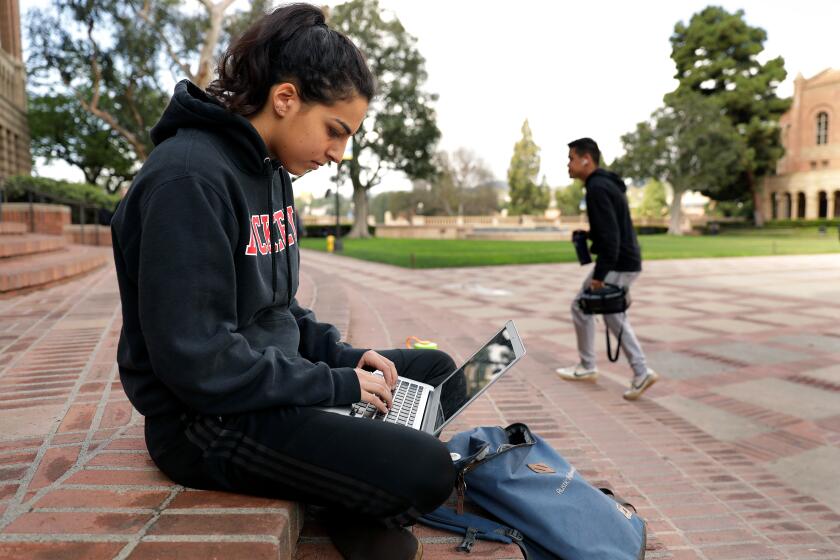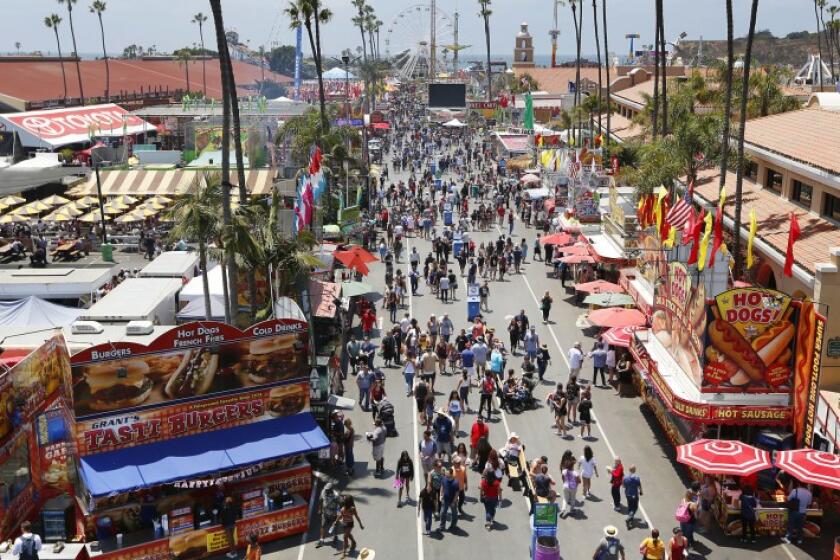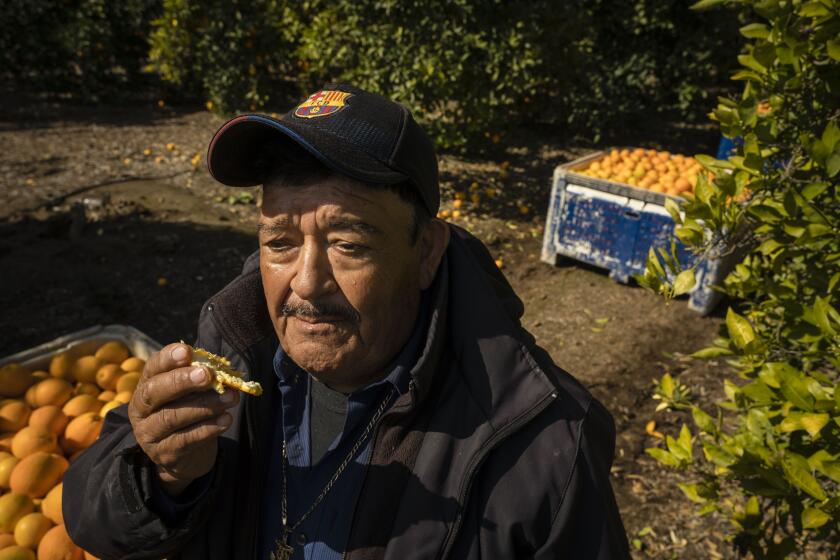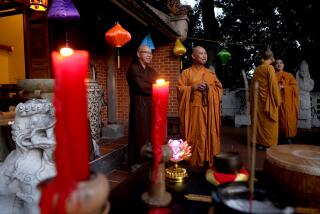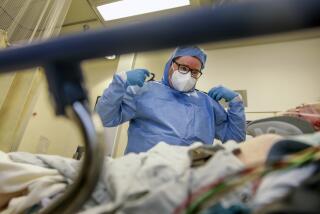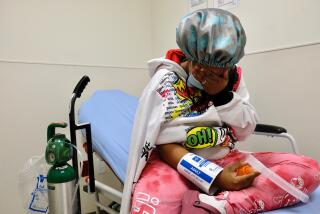55 coronavirus-related deaths in L.A. County is a new one-day high: ‘Devastating power of COVID-19’
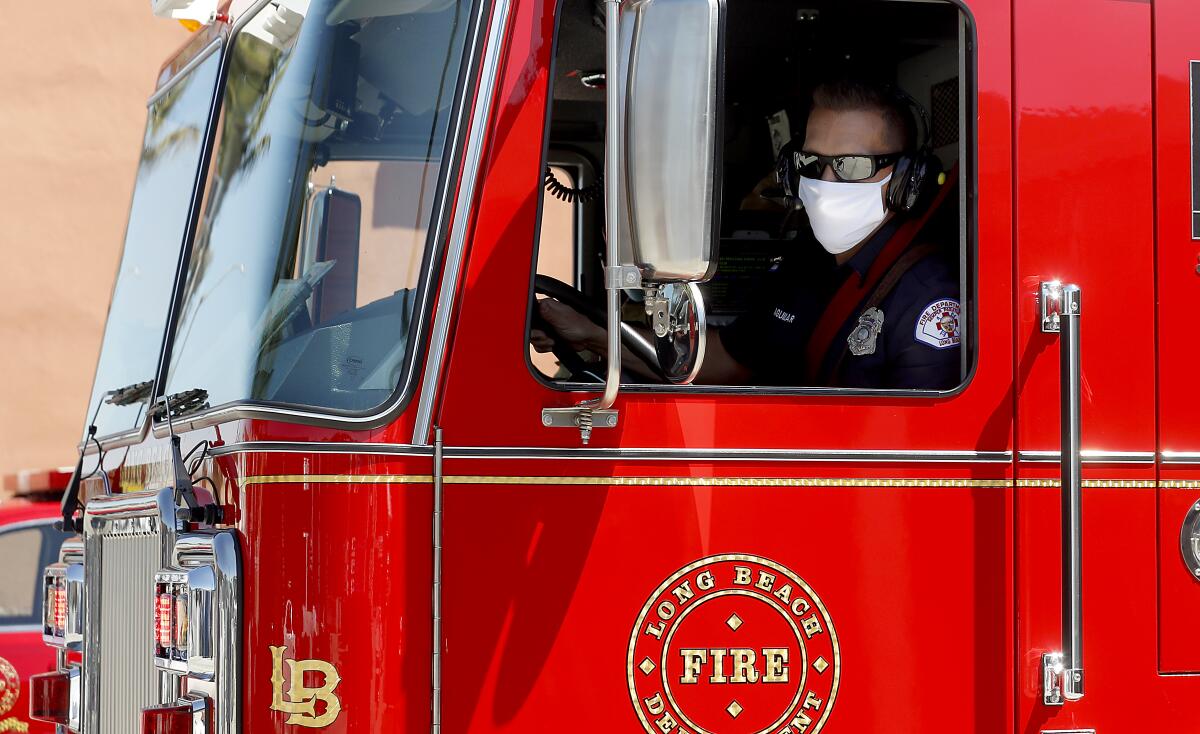
- Share via
Coronavirus-linked fatalities hit another one-day high in Los Angeles County on Thursday as health officials confirmed 55 additional deaths.
The latest update — marking the third straight day the county has seen a record number of deaths — brought the county’s total to 455 and demonstrates “the devastating power of COVID-19,” Public Health Department Director Barbara Ferrer said.
The county’s mortality rate now stands at 4.2%, she added.
Of the latest victims, 43 were over the age of 65 and 39 of those had underlying health conditions, Ferrer said. Nine were between 41 and 65, and all had underlying health conditions, she added.
In total, Ferrer said, 88% of those who have died as a result of COVID-19 had other health problems. That underscores “the need for all of us to work together to make it possible for those who have underlying health issues to remain in their homes,” she said.
L.A. County officials also confirmed 399 new coronavirus infections, bringing the total to 10,854. Although the number of deaths has risen day over day, the number of new COVID-19 cases has trended downward this week.
The University of California was hit with $558 million in unanticipated costs in March alone due to the coronavirus, a staggering sum as students canceled housing and dining contracts, medical centers paused elective surgeries and costs to gear up online learning soared.
Ferrer said there is a natural lag time when it comes to deaths, as “sometimes people can be in the hospital for a few days before they actually pass away,” and that other areas have seen a similar trend.
“You tend to see the deaths continue to rise after your cases may have leveled off,” she said.
Officials also released the following race/ethnicity breakdown for 390 of the 455 people who have died in the county:
- African American 16%
- Asian 17%
- Latino 33%
- White 31%
- Other 3%
As of Wednesday night, 889 deaths had been recorded in the state — including 101 new fatalities since the day before, the largest single-day toll to date.
Still, California’s death totals are far below those of other coronavirus hot spots such as New York, New Jersey and Michigan, and officials credit early social distancing with making a major difference. New York has seen more than 10,000 coronavirus deaths.
Daily tallies of new cases in California suggest the spread of the virus is slowing. So does the number of COVID-19 patients in intensive care units, which has remained between 1,100 and 1,200 since April 7.
Gov. Gavin Newsom said Thursday that 1,191 Californians were in intensive care as of Wednesday — a 1.4% day-to-day increase — but that the overall number of patients hospitalized ticked down by almost 1% to 3,141.
“That’s good news but, again, I caution everybody: One day’s data does not make a trend,” he said.
Here’s an inside look with doctors and nurses on the frontlines of the COVID-19 battle.
More than 27,000 cases have been reported across the state, 1,320 in the last day.
San Diego County reported seven additional coronavirus-linked deaths Wednesday, for a total of 60, as its case count climbed past 2,000.
Riverside County also passed that milestone Wednesday. Following on the heels of its largest single-day increase in cases since the pandemic began, the county reported 144 additional coronavirus infections and four new deaths. Countywide, 2,105 people have tested positive and 54 have died.
In Orange County, there have been 25 deaths linked to the coronavirus — including three each on Wednesday and Thursday. The county also confirmed 51 new COVID-19 cases Thursday, boosting its total to 1,425.
Parts of the Bay Area have also seen higher death tolls in recent days.
Alameda County reported 13 coronavirus-linked deaths Wednesday. The county now has 36 recorded deaths and 962 total coronavirus infections.
Officials there are also contending with outbreaks at two nursing homes. Bay Area prosecutors have opened an investigation into the Gateway Care and Rehabilitation Center in Hayward, where 13 people have died. Forty-one residents and 26 staff members there have tested positive.
At the East Bay Post Acute Healthcare Center in Castro Valley, 22 residents and 23 staff members have tested positive. One resident has died.
Santa Clara County reported 71 new cases and one additional death Wednesday, bringing its totals to 1,793 and 65, respectively.
Dr. Bob Wachter, who chairs the medicine department at UC San Francisco, said Thursday that perhaps 30% to 50% of people who contract the new coronavirus have no symptoms. At some point, he said, there will have to be strategic testing of the asymptomatic.
Wachter joined three Bay Area mayors for a live question-and-answer session on Zoom, conducted by a local TV station. He said UC San Francisco is now testing all patients going in for surgeries and by next week will test every patient who enters the hospital.
The early emergency orders that required people in the Bay Area to shelter in place have kept the infection rate in the region at no higher than 1%, he said. To achieve “herd immunity,” in which a virus can be tamped down because so many people have already been infected, would require a 70% infection rate, he said.
Authorities around the state have warned that life will not get back to normal any time soon.
An internal Los Angeles Fire Department email reviewed by The Times indicates that the city may hold off on allowing big gatherings, such as concerts and sporting events, until 2021 because of the coronavirus threat.
County Fairs from San Diego to the San Francisco Bay area have been canceled, and large music festivals have been postponed over the coronavirus.
“I think we’re a long way off from huge gatherings,” Los Angeles Mayor Eric Garcetti said at his Wednesday evening news briefing. “We can’t reopen things simply because our hearts say that we want to. I will always listen to the doctors; I will always listen to public health.”
Garcetti said he could foresee sports teams being able to play games without live audiences, if public health officials say such a move would be safe.
Following President Trump’s announcement Thursday of new federal guidelines with three tiers of criteria for public health conditions before most businesses can reopen, Garcetti cautioned against thinking of it as three phases but rather a framework for understanding times that will require social distancing restrictions depending on the season, testing and surveillance.
There may be instances when cases spike again, he said, but Angelenos will “at least have some days and weeks and months where we’re not indoors the whole time, where our economy is not suffering, where people are earning an income. I look forward to seeing that.”
Meanwhile, Oakland Mayor Libby Schaaf has called for 74 miles of road in her city to be shut down so people can walk outside and remain six feet away from others. She said Thursday that the plan came about because people on sidewalks were uncomfortable about not being able to socially distance.
The road shutdowns are being phased in gradually so city officials can assess their usefulness. So far, only four miles of road were shut down last weekend. The city plans to add 11 miles this weekend.
“The initial response has been fantastic,” Schaaf said.
Officials are continuing to deal with the devastating economic toll of the shutdown.
Newsom said Thursday that in a recent conference call with Trump and other federal officials and governors to discuss reopening the country, he was grateful for agreement on the “need for a phased approach, a thoughtful and judicious approach based on conditions and based upon the need to act with the kind of specificity at a state-by-state level that is required.”
California is expanding hours at its call center that handles unemployment insurance and is preparing to expedite benefits to independent contractors in response to a record number of people who are out of work and seeking government help.
Newsom discussed those efforts Wednesday and noted that 2.7 million Californians had filed for unemployment benefits in the last month, after businesses across the state shuttered under his stay-at-home order and the economy tanked.
Newsom also announced a $125-million relief effort to help roughly 150,000 Californians without legal immigration status. The governor said the plan is partly funded by nonprofit organizations and would provide cash grants to individuals and families in need. A group of 23 state Assembly members sent a letter to Newsom last week asking him to create such a fund.
“We feel a deep sense of gratitude for people that are in fear of deportation but are still addressing the essential needs of tens of millions of Californians” in food gathering and other tasks, the governor said.
California’s 420,000 farmworkers are working through the crisis. But language barriers and a lack of communication on the coronavirus put many at risk.
The relief program will offer $500 cash grants for individuals in the U.S. illegally and up to $1,000 for families, with applications set to be accepted starting next month, he said.
The money will be disbursed through regional nonprofit groups with experience serving people who are in the country illegally, the governor said.
Times staff writers Taryn Luna, Patrick McGreevy, Andrea Castillo and Maura Dolan contributed to this report.
More to Read
Sign up for Essential California
The most important California stories and recommendations in your inbox every morning.
You may occasionally receive promotional content from the Los Angeles Times.
